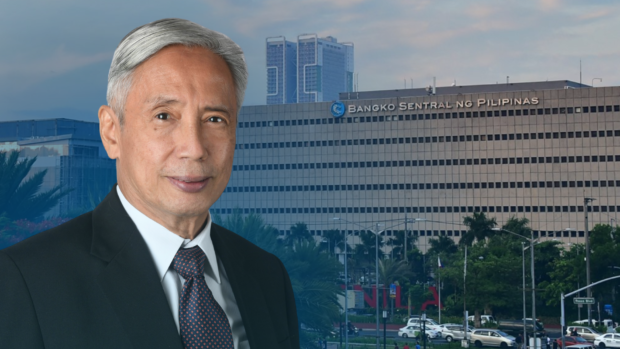
Bangko Sentral ng Pilipinas (BSP) Governor Felipe Medalla | BSP official facebook page and website
The key policy rate of the Bangko Sentral ng Pilipinas (BSP) is expected to rise by another 0.75 percentage point (ppt) in the coming months to peak at 6.75 percent after the Monetary Board raised its forecast for the average inflation in 2023.
The BSP now sees inflation this year to clock at 6.1 percent instead of the 4.3-percent forecast that was made in November 2022.
Along with the 0.5-ppt rate hike from 5.5 percent to 6 percent that was announced on Feb. 16, the higher forecast was attributed to upward pressures coming from rising food prices, transport fares and wages.
MB chair and BSP Governor Felipe Medalla said in a Feb. 17 interview with CNBC that raising the policy rate in two or three more upcoming meetings this year was “difficult to rule out.”
“Want to send a strong signal that inflation remains a problem,” Medalla said. We want year-on-year inflation (meaning, the average inflation in a given month) to be below 4 percent by yearend.”
Eventual pause
The BSP chief added that just a month ago, they expected this to happen by the third quarter of this year. Also, Medalla reiterated in an interview with BloombergTV that—at least for the next meeting to be held on March 23—the decision would likely be either an increase of either 0.25 ppt or 0.5 ppt.
In a commentary, Singapore-based DBS Bank Ltd. the “clearly hawkish” rhetoric of the BSP was likely to prompt higher expectations for the peak or terminal rate that the Philippine regulator would end up with.
“We, therefore, raise our terminal policy rate forecast to 6.75 percent, implying a couple more … increases before pausing in [the second half of 2023],” DBS Bank said. “Another upside inflation surprise could very well attract a follow-up 50-bp increase.”
Shift in tone
The Singaporean bank was alluding to the higher-than-expected 8.7-percent inflation readout in January.
For The Netherlands-based ING Bank, Medalla’s “obvious shift in tone” means that the BSP will raise the policy rate by 0.25 ppt in March to bring it to a peak of 6.25 percent.
On Feb. 16, Medalla said in a press briefing that “it is unlikely we won’t increase the rate at the next meeting [in March].”
Pantheon Macroeconomics, which is based in the United Kingdom, agrees that the BSP will indeed do so, but as a minimum possibility. There could be more in subsequent MB meetings.
“While we now see at least an additional 25-bp interest rate increase in March, we are also sticking to our view that a partial rollback of this tightening cycle will start before the end of this year, to the tune of at least 50 bp in cuts in [the fourth quarter,” it said.
“By then, we expect headline inflation to have returned comfortably within the 2 percent-to-4 percent target range [in a given month], while the economy will have shown a more noticeable loss in momentum,” it added.

